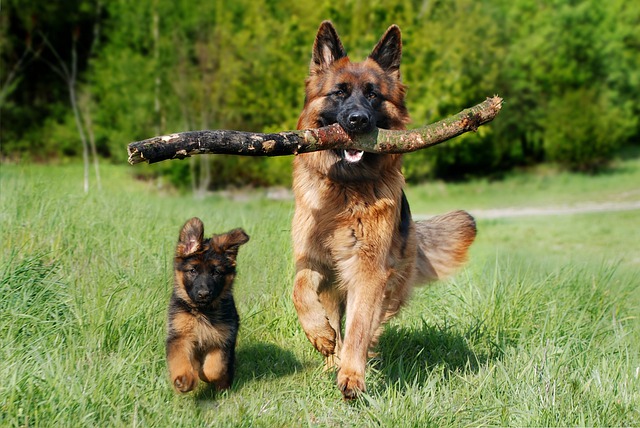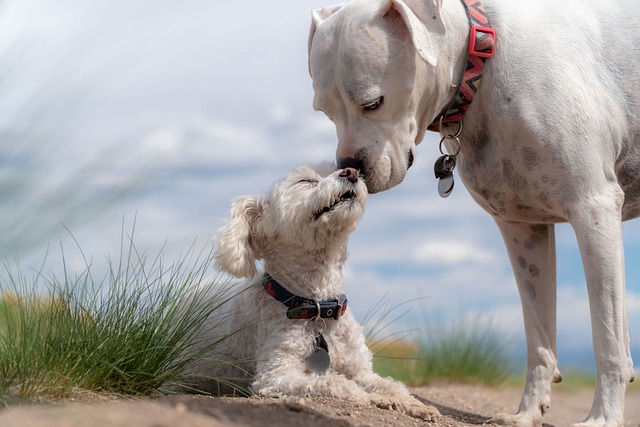When you’re considering adding a puppy to your family, one of the things you have to think about is how it will impact your existing pets. If you have an older dog at home, getting a new pup can be a big adjustment – and it’s important to make sure that everyone in the house is on board with the change. In this blog post, we’ll take a look at some best practices for making the transition from senior dog to puppy go as smoothly as possible. It’s extremely relevant for me right now as I have Chester who is 12.5 years old & we lost his little sister Holly 6 months ago. I certainly have considered if he would adapt to a new puppy in the house….

Are Puppies Good for Senior Dogs?
Getting a new puppy for an older dog makes sense in certain ways. Puppies can offer older dogs companionship, help them stay active, keep their minds sharp, and even extend their lives. They can also serve as welcome diversions for dogs who are lonely or bored due to the departure of a canine companion or family member.
Before you go out and buy your older dog a new furry friend, there are a few things you should think about. Puppies require lots of attention, training, exercise, patience, and time. They’re frequently mischievous, have short attention spans, and can’t be left alone for long. Goldendoodles come with a high price tag, so you’ll want to be sure that this breed fits your budget. They also have a reputation for being highly energetic and active. Furthermore, they aren’t house-trained, so they’ll need to learn how to behave in a home environment.
However, don’t let the fact that these things exist deter you from taking home a puppy for your aging dog. It’s only important to think about things like your lifestyle, schedule, and senior dog’s needs before making a decision. Older dogs have fewer health and behavioral issues than younger animals, making them easier to care for. This will assist guarantee that your older pet gets all of the benefits of having a puppy in their life without any unexpected difficulties.

What to Consider Before Getting a Puppy for Your Senior Dog
If you’re thinking about acquiring a puppy for your old dog, there are a few things to think about first:
Your Lifestyle and Schedule
As we previously said, puppies require a lot of attention and training. If you work full-time, spend a significant amount of time away from home, or have a hectic schedule in general, adopting a new puppy may not be the greatest idea.
It’s also important to remember that caring for two dogs at once is a lot of work! It’s probably best to postpone adding another pet to your family until things have settled down if you’re not sure your home or lifestyle can handle two dogs.
Your Senior Dog’s Overall Health
Another thing to think about is your dog’s overall health. If your older dog is in good shape and acts regularly, acquiring a puppy may be a wonderful option. However, if they have age-related health problems, a new puppy might be too much stress for them.
Arthritis, hearing or vision loss, mobility difficulties, and canine cognitive dysfunction are just a few examples of typical age-related health problems in dogs. They can all have a significant impact on your elderly dog’s overall health and wellbeing, making it tough for them to get used to a new animal in their home.
Your Senior Dog’s Temperament and Behavior
Another essential element to consider is the temperament and behavior of your senior dog toward other dogs. While some older Dogs can adjust almost immediately, others may have a more difficult time adjusting to the addition of a new pet.
If your senior dog is very docile and gets along well with other animals, then a puppy can be a great companion for them. But if they are very dominant or have a history of being aggressive toward other dogs, a new puppy may create tension in the home.

How to Introduce Your Older Dog to a New Puppy
If you’ve decided on bringing a puppy home for your older dog, certain preparations must be made to ensure everyone’s safety and happiness. Here are some pointers for introducing an adult dog to a younger one:
Introduce Them Outside the Home
Introduce your elderly dog and puppy to one another in a non-threatening environment outside of your house. This will aid in the reduction of territorial aggressiveness, as well as allow everyone to get acclimated at their own pace. Allow your senior dog to smell around the puppy before allowing them to interact with one another. Allow ample time for both dogs to become familiar with one other’s odors and proceed cautiously.
Take Things Slowly When You Bring Them Home
When the moment is right for both dogs to meet inside your home, be sure you watch them carefully at first. This will allow you to act swiftly if there’s any tension or conflict. Slowly allow them to spend more time together indoors once they are comfortable with the new situation. It may take weeks for your older dog and puppy to feel at ease around each other in their home setting; give it some time before expecting too much from either of them!
Don’t Try to Force a Bond or Relationship Between Them
Older dogs may be hesitant to bond with a new dog, especially if they’ve been without other pets for years in their previous home. Don’t worry if your old dog isn’t too enthusiastic about the puppy at first; it may take some time. Keep an eye out for encouraging body language such as wagging tails and relaxed postures, but don’t push them to connect if they appear uncomfortable around each other.
Be Prepared for Setbacks
Remember, this process takes time. If things don’t go smoothly right away, it’s vital not to get discouraged. Keep at it and be patient with your older dog and new puppy until they can live together comfortably. If you’re seeing any aggressive or territorial behavior, make sure to seek professional advice from a qualified animal behaviorist.
Let me know if you have successfully (or otherwise!) introduced a puppy to your older dog…?
